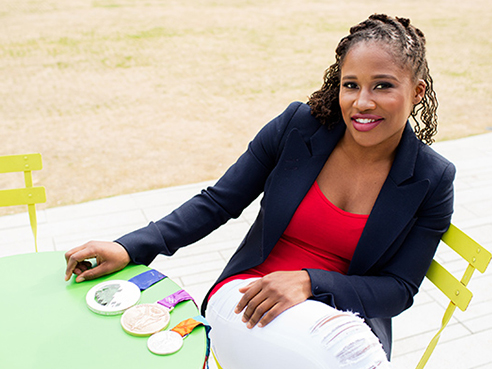Ask an Expert: AAU Alum Lauryn Williams (Part 1)
02/02/2018
Once every two years, the greatest athletes from around the world represent their countries with pride and compete to etch their names in the history books. There may be no one better equipped to break down what it takes and what the stage feels like more than AAU alum Lauryn Williams.
Once every two years, the greatest athletes from around the world represent their countries with pride and compete to etch their names in the history books. This massive event is truly a spectacle, and there may be no one better equipped to break down what it takes and what the stage feels like more than AAU alum Lauryn Williams.
As one of only five athletes, and the first woman, to take home hardware in both winter (bobsledding) and summer (sprinting) events, Williams can provide unparalleled advice and knowledge on the topic.
Our friends at Eastbay sat down with the legendary competitor to hear all about her experiences on the global stage.
*Visit the Eastbay Blog for breakdowns of the latest athletic gear, exclusive interviews with your favorite athletes, and monthly workout tips.
PART 1: TRAINING FOR THE STAGE
Q: How did training for a huge event like this differ from how you trained normally year-round?
Happy birthday to me!! This is how I brought in my 30th. #dirtythirty pic.twitter.com/1Z1ujipb2W
— Lauryn Williams (@LaurynCwilliams) September 11, 2013
A: “You don’t train any differently for the games. That’s one of the biggest pieces of advice I give to people who are training for the team. Do what you know works, don’t do something completely different. A lot of times people get poor performance at the games because they are like ‘ok, I made the team, now I have to go above and beyond.’ But the thing that helped you make the team is the thing that will help you perform while there.”
Q: Can you walk us through what your training routine looked like?
A: “I trained roughly three hours a day, six days a week.
We would start with early morning, 6 a.m. weight room workouts, then we’d come back in the afternoon for the running portion. Depending on what day it was, it would be a harder workout or a sprint workout.
Wednesday was our recovery day, so we could regroup — which was really important. A mistake athletes everywhere make is overtraining. A lot of times, you’ll hear people say ‘you need to work smart, not hard,’ and I completely agree. You can’t work yourself to the bone and think it’s going to make you the fastest.”
Q: Competing on that stage also meant added pressure and expectations. How did you prepare mentally for that?
A: “The biggest thing for me was telling myself ‘I am good enough to be here.’ So often you second-guess yourself and compare yourself to the competition, but, in reality, mental prep is knowing you’ve done everything you possibly could to make the result go in your favor. Then you just need to go out there, relax, and realize your potential.
In my sprinting events, I often had only 100 meters. I had 11 seconds or less to make the most of my moment, so if I had spent the time thinking about what my neighbors were doing — it would have gotten me off track and the result wouldn’t have been as good.”
 Email
Email Print
Print









